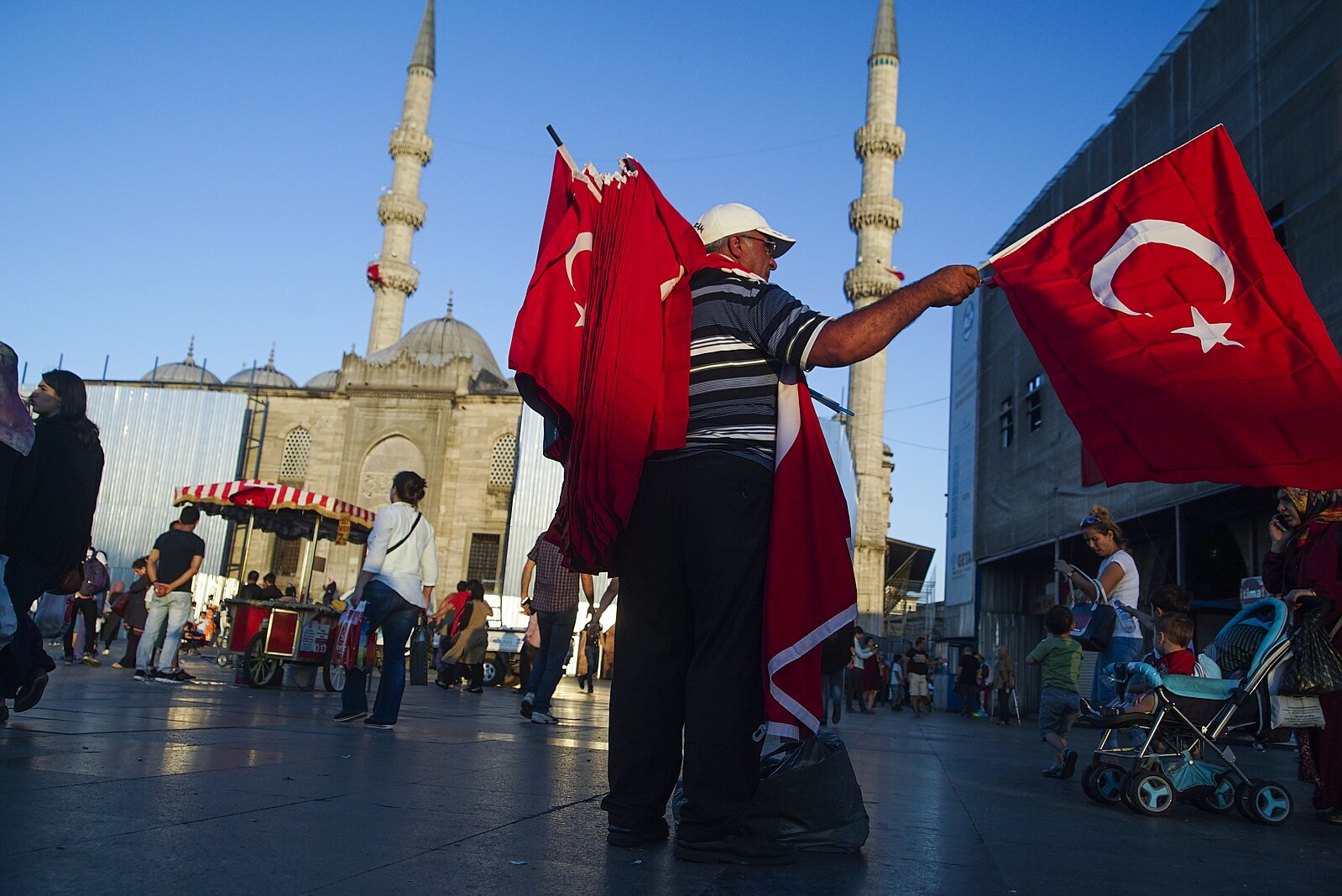Can the Turkish Opposition Develop a Sustainable Kurdish Policy?
Editor’s Note: This article originally appeared on Order from Chaos.

Published by The Lawfare Institute
in Cooperation With

Editor’s Note: This article originally appeared on Order from Chaos.
Since 2002, the rule of Turkish politics has been clear and simple: Turkey periodically holds elections, and the winning party remains the governing Justice and Development Party (AKP) and President Recep Tayyip Erdoğan. The last local election held on March 31 and Istanbul’s re-run election on June 23 were exceptions to this rule. The AKP suffered its most severe electoral defeat to date by losing almost all of Turkey’s major cities to the opposition, including Istanbul and Ankara.
Among other factors—including economic deterioration—the single most important factor in the opposition’s victory and the government’s defeat at the polls was the Kurdish vote. More specifically, it was the pro-Kurdish People’s Democratic Party’s (HDP) decision to support the opposition candidates in major metropolitan cities, instead of fielding its own candidates. That decision paid off handsomely. Now, however—in light of the government’s heavy-handed criminalization of the HDP and Turkey’s incursion into the Kurdish People’s Protection Units (YPG)-dominated northeastern Syria—the opposition bloc is doing a delicate dance around the Kurdish issue.
The Party Scene
Managing its electoral victories and sustaining the coalition behind it will not be an easy task for the opposition, particularly for the main opposition, the Republican People’s Party (CHP). The opposition bloc was officially made up of the secularist CHP and the nationalist Good Party (İyi Party). Yet this bloc, unofficially, also contained the pro-Kurdish HDP and small Islamist Felicity (Saadet) Party.
As the adjectives in front of their names aptly indicate, these parties adhere to starkly different political and ideological projects—this is unlike the governing coalition, which is made of the ruling AKP, the Nationalist Movement Party (MHP), and another smaller nationalist party, the Grand Unity Party (BBP). This latter coalition is politically more homogenous. The opposition bloc, in contrast, was essentially an election coalition, necessitated by the imperatives of the political (electoral) arithmetic.
The most important common denominator of the parties that formed this coalition has been the desire to defeat the governing coalition and President Erdoğan in the polls. Even though this common motivation brought the opposition bloc together in the first place, it might not be sufficient on its own to sustain cohesion. This is particularly true as many of the politically divisive issues—the Kurdish issue foremost among them—are once again dominating the political agenda in Turkey.
Navigating the Thorns
The Kurdish issue is the thorniest and will test the resilience and durability of the opposition bloc. Finding a common ground between the Good Party and the HDP isn’t easy.
As the leading party within the opposition bloc, the CHP needs to cultivate a formula that will satisfy the pro-Kurdish HDP’s political demands and at the same time prevent the opposition bloc from fragmenting. This is a difficult task that the CHP has had to achieve in order to maintain political momentum since the local elections.
Politically, a new stance on the Kurdish issue will arguably be the clearest demonstration that the opposition CHP is embracing a more reformist path. Putting aside a brief period (the late 1980s and early 1990s) when CHP predecessor the Social Democratic People’s Party (SHP) tried to advance a political solution for the Kurdish issue—as opposed to the dominant military approach of the time—the CHP has largely adhered to the statist and the status quo policy on the issue. This approach was centered on three dimensions: fighting terrorism (i.e. the Kurdistan Worker Party, or PKK), addressing the economic underdevelopment of the Kurdish region, and offering some cosmetic cultural rights to the Kurds. Hence, the CHP’s stance on this issue was missing the realities and complexities of the Kurdish question, and fell short of meeting the Kurdish political demands.
Yet recently, the CHP has signaled a policy change on the issue. For instance, the CHP unequivocally criticized the government’s removal of the three Kurdish mayors of cities in the Kurdish-majority east and southeast of Turkey on politically-motivated, tenuous charges. The party called it an unlawful political coup. For his part, the new CHP mayor of Istanbul Ekrem İmamoğlu travelled to Diyarbakir to show solidarity with the Kurdish mayors. He also recently declared that Kurdish-language courses would now be offered in Istanbul Metropolitan Municipality Art and Vocational Training Courses (ISMEK), provided that there is sufficient public demand and teachers. Finally, there have been many reports that the CHP is preparing to announce its own perspective on the resolution of the Kurdish issue. Taken together, these steps all indicate a major policy change on the Kurdish issue. Obviously the CHP isn’t in power and therefore its new approach will not bear immediate policy consequences. Yet, if sustained, this new policy course could be for the better, and is important for three reasons in particular.
First, at a time when the governing bloc regressively securitizes the Kurdish issue in its entirety, the CHP frames the Kurdish issue as a political one, which can only be resolved through political measures, not military ones. This is a positive development. Second, the political resolution of the Kurdish issue is intimately tied to the further democratization and reform agenda for Turkey. Therefore, advocacy for the political resolution of the Kurdish issue goes hand-in-hand with advocacy for further democratization and reform.
Third, maybe even more importantly, the CHP takes pride in being the founding party of the modern Turkish republic and the bearer of that official ideology. The Kurds, in contrast, regard themselves as the main victim of this official ideology (similar to how the Islamist-conservative segment of society felt previously). As “co-victims,” in this framing, some have thought that the AKP and Kurdish political actors were well placed to deliver a historical resolution to the Kurdish issue. Yet the governing bloc’s highly nationalistic turn in recent years has shattered these hopes. If the CHP develops and sustains a reformist political stance on the Kurdish issue, it could sow the seeds of a historical reconciliation between the official ideology and its main victim. Nevertheless, one needs to keep in mind that despite the initial positive signs, it is still too early and immature to claim that the CHP will take such a route.
Re-orienting the Conversation
Yet, these positive steps that the CHP has recently taken on the Kurdish issue are also the same steps that will put the future of the CHP-Good Party alliance in jeopardy. The Good Party officials have recently expressed their uneasiness and displeasure with the CHP’s positive steps towards the Kurdish issue in general and the HDP in particular. The spokesperson of the party, for instance, said that their alliance with the CHP shouldn’t be seen as a Catholic marriage, meaning that it isn’t set in stone.
On this point, President Erdoğan sees an opportunity to break the opposition bloc. Given its fragility and vulnerability on the Kurdish issue, the government and President Erdoğan are likely to pursue even harsher and more nationalist policies on the issue in order to drive a wedge between them.
Thus far, this strategy is working. Starting with the removal of the newly-elected mayors from their posts, the government is pursuing a policy of complete criminalization of the pro-Kurdish HDP. This policy is set to continue. Developments in Syria, with the emergence of a territorially expanding Syrian Kurdish self-rule since mid-2012, was one of the major factors that led to the launching and then termination of the Kurdish peace process from 2013-15. Turkey believed that the resolution of the Kurdish issue, on the top of domestic political considerations, was imperative to unfetter its (back then) ambitious regional policy from one of its major impediments. Yet the inability for the government and the PKK-affiliated Democratic Union Party (PYD) to agree upon some form of modus vivendi has significantly contributed to the collapse of this peace process.
Likewise, Turkey’s recent Syria incursion may prove to be a breaking point for the opposition bloc. Apart from the HDP, all of the opposition parties currently support Turkey’s military operation into the Kurdish YPG (or Syrian Democratic Forces)-dominated northeastern Syria. Depending on how each party’s stance evolves, particularly that of the CHP, either the CHP-Good Party coalition will fall apart (although this doesn’t necessarily mean that the Good Party will join the governing bloc) or the emerging fledgling alliance between the CHP and the HDP will hit its limits.
On the Kurdish issue, the CHP has thus found itself between a rock and a hard place. Satisfying the Kurdish demands may ultimately culminate into losing the Good Party. On the other hand, the CHP’s over-attentiveness to the Good Party’s concerns is likely to alienate, if not antagonize, the Kurds. And muddling through isn’t a sustainable policy position for much longer either.
At this stage—apart from developing a clear policy in support of Kurdish language rights, rejecting anti-Kurdish regional policy, and supporting political agency of the HDP—what can the opposition, and particularly the CHP, do? It should work to change the Kurdish-issue-centric political agenda. With the Syrian incursion and international reactions to the operation, changing that agenda is a tall order. But the CHP still needs to, at least, bring new items to the table. Prior to the recent local election, the opposition bloc was a proactive agenda-setter, putting the governing coalition in reaction mode. In the aftermath of the election, the opposition lost this proactive momentum. Once again the government appears to be setting the terms of Turkish politics while the opposition is trying to catch up.
The contest is now taking place within the government’s comfort zone: nationalism (hence different manifestations of the Kurdish issue) and populism. For the opposition to remain viable, it must change the premise of the contest and highlight new topics (e.g. anti-corruptions laws, transparency in public procurement and bidding, the nature of the political system). Such political initiatives will keep the spotlight on the government’s weaknesses and vulnerabilities, and force the AKP to continue to be reactive and not the agenda-setter.


.jpg?sfvrsn=407c2736_6)


